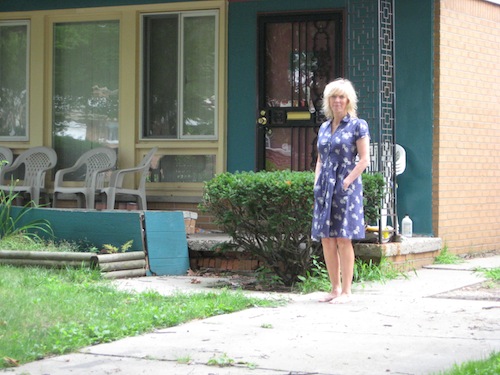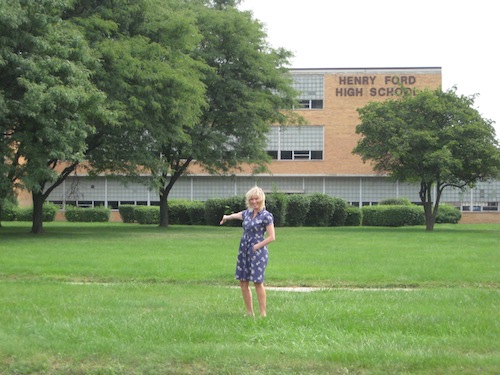Heading east on 8 Mile just past Telegraph, I began feeling a shortness of breath. It wasn't from jogging, or even the heat. It was because my old college roommate, Colette, was driving me into Detroit to see the house I grew up in for the first time in nearly 40 years.
It had been a modest little Wonder Years house in the city's Northwest section -- $13,500 when my parents bought it new back in 1955. In those days, the postage-stamp lawns were manicured, and a Sears above-ground swimming pool was all it took to make you the most popular kid on the block.
My own childhood had been something less than idyllic. My mother was away for long stints at the Northville State Psychiatric Hospital, my dad, a chemical engineer at Chrysler, was paralyzed in a shallow-water diving accident, and my best friend from junior high was later shotgunned to death by a biker gang in an L.A. drug deal gone bad. Stuff like that.
After I left home for the University of Michigan in 1972, I figured I'd escaped. If anyone asked where I was from, my stock answer was: "Detroit. And all I know about it these days is what I see on Animal Precinct when they bust a dogfighting ring." Hahaha. LOL.
But when I spotted the party store on the corner of 8 Mile and Berg Rd., some kind of homing device kicked in. "Turn here," I said to Colette. "Let's go see my old elementary school."
In the old days, St. Eugene's was where, on Sunday mornings, kids stared as my crippled father struggled up the aisle on his clanking Canadian crutches. Now, the first thing that registered as I walked through open doors was empty space. "I went to school here 50 years ago," I blurted to a young man. "Where's the altar?"
"Oh, we haven't had one for a long time," he said, smiling. "We're a charter school now, and this is summer camp."
A dozen kids were having pizza and milk at wooden tables. "Hi -- I went to school here 50 years ago," I said, swallowing hard." Blank stares. "And then I moved to New York City and I was a writer at People magazine." That did the trick. By the time Colette took a souvenir photo, they were all waving for the camera.
Afterward, driving down my old street, everything seemed smaller, except for the overarching trees. The white paper birches in front of my house were gone, replaced by an ugly outdoor lamp. My mother's beautiful roses and peonies were now weedy scrub.

Two houses down, a young girl was helping a smaller one ride a pink bike with training wheels. "Hi," I ventured. "I used to live in that house over there 50 years ago. And I learned to ride a bike on one just like yours." They weren't sure what to make of me, but they were polite about it.
Their dad walked over, shook my hand and welcomed me back to the neighborhood. Then Granma came out and did the same. I told her that I'd worked at Time Inc. for 32 years, and written two bestsellers. "I did good," I said softly.
"Yes you did," she said. "You did real good."
As the day went on, I began to wonder. Could Detroit become the hub of a new, green economy -- reborn as the U.S. manufacturing center for wind turbines and solar panels? Was it really possible to transform abandoned houses into agricultural plots, maybe invite Michelle Obama to town to teach kids about vegetable gardens? What if all the Hollywood A-listers who'd been filming movies in Detroit were chauffeured around in Chevy Volts -- and GM's CEO had delivered the first one off the assembly line to Larry David's front door?
Finally, staring up at a beautiful old factory building downtown, it hit me. I have been to Paris and Pakistan, Istanbul and Bosnia. But I have never seen anything quite like this: Detroit is a state-of-the-art, urban frontier. My tattered hometown has, somehow, become "revisionist cool."
Back in Manhattan, I thought I might have imagined it all. Then, in a week's time, a friend sent word that my old, shuttered high school -- Henry Ford -- was slated for a $17 million renovation. Someone forwarded a front-page story in the New York Times heralding the auto industry's turnaround. And on an Entourage re-run, hipster Johnny Drama was wearing a jersey emblazoned with "DETROIT."

These days, whenever I think of my hometown, I can't help but remember the old, gray-bearded guy I saw hunched over his cane, panhandling near Greektown. "This is all I've got," I told Colette, slipping her a five to pass to him through the open car window.
"God bless you," he said to her, leaning down to eye level. "And also that beautiful lady sitting right over there next to you."
I flashed him a four-headlight smile. "I used to live in Detroit, and I haven't been here in 40 years!" I called out as the light turned green. Waving, he drew himself up to full height, suddenly looking like a much younger man. "Welcome home!" he hollered. "Welcome home!"
By this stage in life, we all know that you can't go home again. The good things always seem smaller and more distant -- never as bright and shiny as you remember them. But maybe the sad, awful parts aren't quite so big anymore, either -- especially after you've seen what the rest of the world can dish out.
Maybe it's only then, after the bad memories have finally been laid to rest, that there's just one thing remaining on the horizon. And who's to say that it isn't the glint of the future's golden promise?